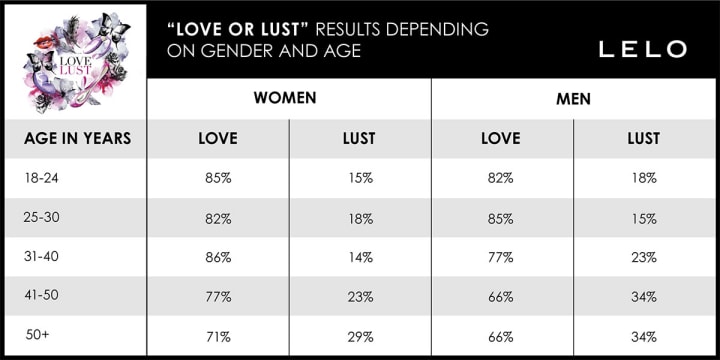Is Valentine's Day Really About Love?
Whether you're after love or lust, the meaning of Valentine's Day is in the eye of the beholder.

Whether or not you hail Valentine’s Day as the most sacred of holidays or a mere Hallmark sales ploy, February 14th means something to everyone. If you have a significant other, you devote the weeks prior to dropping not-so-subtle hints about what is and isn’t a respectable token of affection, and if you don’t, you either wallow in solitude or initiate an emergency mission to find a V-day date, and fast. You leave no dating app unswiped, no party un-flirted, no eyelash un-batted.
Whether we believe in Valentine’s Day as a god-given holiday or a consumerist scheme, most people are unperturbed by (if not entirely unaware of) its questionable roots; February 14th is as good a day as any to express love to someone you care about. Still, to understand what we’re really celebrating—or not celebrating—when we honor Saint Valentine might serve us well to avoid putting too much pressure on ourselves. At the risk of bursting heart-shaped bubbles around the world, a brief look into the history of Valentine's Day unquestionably settles the debate of whether the holiday is about love or lust; the fact is, what it's really about is, well... both, one, or neither. Valentine's Day, it seems, is in the eye of the beholder.
Pagan Passion, Roman Rulings, and Goat Blood

History suggests that to really honor the tradition of Valentine's Day would require (among other things), strips of goat hide dipped in sacrificial blood, to be slapped against the bodies of naked women and promote their fertility as per the ancient Roman Lupercalia festival. This practice, the ancient pagan fertility festival held in mid-February, is thought to be the reason Saint Valentine’s feast falls when it does, the Catholic Church having been determined to Christianize a historically pagan holiday. If blood-soaked goat skin is insufficient to make your heart go "thump thump," perhaps the additional fact that February 14th more or less marks the beginning of bird's mating season will do the trick. 15th century poet Geoffrey Chaucer said so himself:
“For this was sent on Seynt Valentyne’s dayWhan every foul cometh ther to choose his mate.” —"Parliament of Foules"
Birds tend to mate for life, so naturally, the day they mate is the perfect day for humans to celebrate their relationships, too. If bird couplings don't resonate with you, maybe it's illicit marriage that ignites your passion. Consider Saint Valentine, the holiday's namesake; in fact, the so-called patron saint of love was really the patron saint of marriage—which cannot arguably be equated with love or sex. According to the most commonly held theory, Valentine was a Catholic priest in 3rd century Rome who conducted illegal marriages in secret in response to the Roman Emperor having banned young men from marriage on the grounds that a wife and kids would distract them from warfare.
In light of these oft-disregarded historical events, Valentine's Day really is what you make it. Since ancient Rome, we’ve protected the sanctity of marriage, we’ve increased opportunity for sex and fertility, and we've mimicked bird relationships—but where’s the L word?
At the expense of the world’s romantics (and to the delight of V-day boycotters), the origin of Valentine’s indicates that for better or for worse, all of our modern-day emotions surrounding the holiday of love are figments of our culture, demographic, and personal relationship status. Since there is no one predetermined impetus for the holiday in its modern form, the best, and perhaps the only way to identify whether Valentine's Day is about love or lust or to ask the people that celebrate it.
Love or Lust?

Research via LELO
The simplest questions can often be the most revealing. One team of romantic investigators at LELO surveyed around 1,000 people—men and women across all ages, countries, and relationship statuses. The question asked was simple: Is Valentines Day About Love or Lust?
One of the most visible patterns seen in the collected data was that an overwhelming majority of people value love over lust, in general and on Valentine's Day in particular. The interesting part lies in the general trends of how these percentages change over time. For example, the survey showed that age makes people more frisky and less romantic; both men and women showed a steady increase in "lust" as they got older—their collective lust percentage shot up from around 17 percent at ages eighteen to twenty-four to 31 percent after turning fifty. There is scientific basis for this; that being mens' decrease in testosterone, and womens' decrease in estrogen over time (i.e. a decrease and increase in libido, respectively). This research is all to say that one's perception of what Valentine's Day means is a direct reflection of their biology. People are programmed to love or to lust, they don't do so because Saint Valentine told them to.
Can Anybody Find Me Somebody To Love (or Lust)?

Research via LELO
Biology aside, whether lust or love is more important can also be a function of logistics: there's no sense in valuing love when you have no one to love at the moment, and there's little advantage in prioritizing lust when you have someone to love—I would venture to say that if you have love in your life then you also have sex. The LELO survey got at the root of human motivation by pitting the love-lust breakdown against someone's current luck in love. While overall, majority of people reported loving or lusting, there were some specific discrepancies that are quite revealing.
Single people across both genders greatly value love over lust (between 75-80 percent), while those in an open relationship significantly de-emphasize romance; only 29 percent of women in open relationships prioritize love while a whopping 71 percent chose lust. These results are dramatic, but remarkably intuitive if you consider what someone's mindset might be in both of those groups. A singleton has no one special in their life, but an abundance of individuals at their disposal with whom to share a lust-filled bedroom romp. Valentine's Day, then, is not about lust-because every day is Lust Day for single folk. Conversely, people in an open relationship are by definition more sexually oriented and less inclined to view love as the end-all-be-all. So unsurprisingly, individuals in an open relationship would see Valentine's Day about lust because, frankly, they're always lusting and are perfectly willing to admit valuing physical desire on V-Day and every day.
So, there you have it. Whether you're single, married, old and frisky or young and romantic, have yourselves a Happy Valentine's Day.
This luxury gift box by LELO is perfect for those couples seeking a little pleasure this V-day. The Luxury Gift Box contains the always luxurious Soraya, a dozed red bath roses, and a 75ml of water-based personal lubricant. Go on, you both deserve it. ;)
About the Creator
Lizzie Boudoir
Thrice married, in love once, overly romantic, and hypersexual.






Comments
There are no comments for this story
Be the first to respond and start the conversation.